Updated On: 04th, January 2024
Just like home, buying a dream vehicle is on everyone’s bucket list. Isn’t it? As it requires lakh of investment to buy a car, people in India prefers to avail a car loan to minimize the monthly expenditure and spread it throughout the years.
The procedure to get an auto loan is quite lengthy and detailed and having a clear view about the process before you contact any lender for the car loan is always a better idea. So, if you are thinking of purchasing a vehicle in 2022 , then here we have brought all the information related to car loans in India under one roof. Know the effective interest rates, loan amounts, loan tenure, and other relevant details before you get any car loan sanctioned in your name.
Features of Car Loan
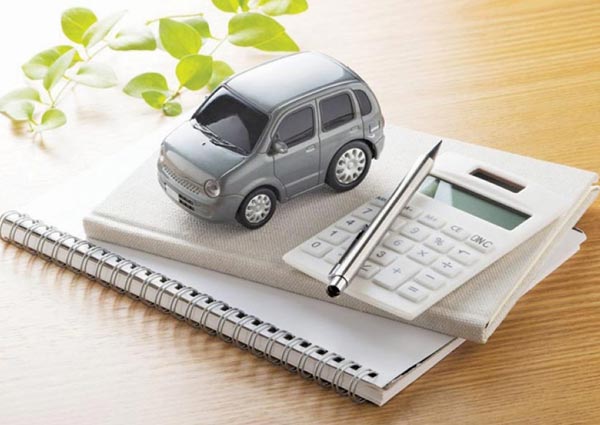
Understanding the functioning of a car loan will help you take a wise and well-informed decision regarding the right car loan. Find below the best features of a car loan:
1. Loan amount: The threshold limit for a car loan amount is 80-100% of the ex-showroom/on-road price of the car. When you pay a maximum down payment for your car, your car loan amount is less.
2. Interest rate: A person who takes a car loan has to pay an interest on the principal amount of loan on a monthly basis for specified loan tenure. The rate of interest on car loan is different for every bank.
3. Loan tenure: A car loan can be procured for loan tenure ranging from 1 to 7 years. A short-term car loan has a higher EMI and has to be repaid in a short period of time. A car loan for a long tenure has low EMIs for a long time.
4. Car loan EMI: Car loan is always repaid to the lenders in Equated Monthly Installments (EMIs). The EMIs can be calculated using an online car loan EMI calculator available on the website of the car loan lenders. Enter loan amount, rate of interest, loan tenure, and processing fees to get instant results.
5. Processing fee: This charge is a small percentage of the loan amount charged by the bank to process your car loan that will be deducted when the car loan is disbursed to your bank account.
6. Type of car loan: Banks offer three kinds of car loans such as new car loan, loan against car, and used car loan.
7. Prepayment: Car loan lenders allow borrowers to repay the car loan after the successful payments of 12 monthly installments. In such a case, the borrower has to make the payment of a penalty fee which is also called a prepayment fee.
8. Preclosure: When the borrower decides to pay the full car loan amount before the end of the loan tenure is called a preclosure. The banks or third party lenders charge a preclosure fee on the remaining principal amount to preclose the loan.
9. Foreclosure: When the borrower makes a default in the payment of the car loan, the bank will auction the car that is also collateral to compensate the outstanding loan amount. This is known as a car loan foreclosure.
Advantages of Car Loan

Taking a car loan can be expensive compared to buying a car with full down payment. But with the concept of loans on cars undergoing a massive positive change, you can seek the following features and advantages that can make this procedure a simpler and hassle-free one for you. Car loan lenders now offer highly customized and specialized services to their customers at affordable rates.
- A car loan help you buy a four-wheeler even if you lack sufficient funds.
- Some car loan lender finance 100% of the amount of your car.
- A majority of the car loans lenders help you buy your car with zero down payment.
- There are banks that even offer car loan facility in the value of crore if you want to buy a luxury car.
- Car loan is offered as a secured loan with your car being the collateral or security for the loan.
- Getting a car loan is comparatively simple than other loans like home loan. People with less credit scored can even procure a car loan.
- Most of the car loan lenders or banks charge a fixed rate of interest. It means that you have to pay a fixed amount towards the amount of your loan on a monthly basis.
- Most of the lenders consider credit score as the basis to offer car loans and a person with higher credit score will attract a cheaper loan.
- Car loans can be taken on pre-owned cars as well.
Type of Car Loans India

There are three kinds of car loans offered by banks and third party lenders in India:
1. New car loan: A new car loan is procured to purchase a new car from the showroom. The usual interest rates charged on new car loans ranges from 9-14% per annum for loan tenure of 1-7 years. The majority of the banks and NBFCs finance 80-90% of the ex-showroom or on-road price of the car loan amount.
2. Used car loan: Banks and NBFCs provide used car loans up to a limit of 80-90% of the cost of the used car at a rate of interest of 12-18% per annum for loan tenure of 1-5 years. This car loan is usually taken to buy used cars that are less than five years old and not more than 10 years at the time of maturity of the car loan.
3. Loan against car: This type of a car loan is procured when a person pledges his or her old car as a security against the loan to purchase a new car. Most of the banks offer up to Rs. 10 lakh or 100% of the car value as a car loan at a rate of interest of 14-15% per annum up to loan tenure of 3 years.
New car vs. used car loan
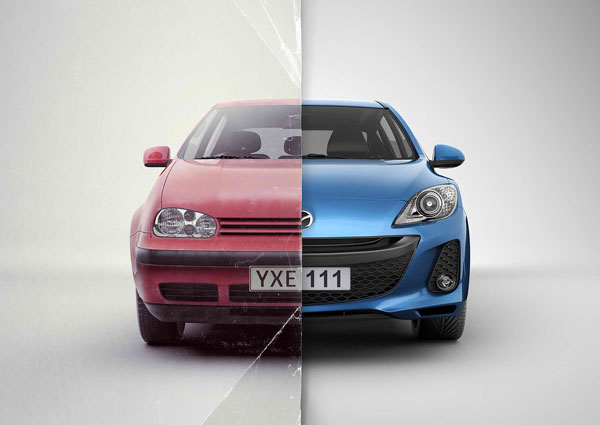
Both these car loans vary in terms of the interest rates, purpose of loan, and loan tenure.
- Loan amount: The loan amount procured on a new car is much higher than the loan amount for a used car loan due to the changes in the price values. The amount of loan sanctioned for new cars is 85-100% of the on-road or ex-showroom price. In case of used car loans, the bank sanctions only 70-80% of the cost of the used car.
- Rate of interest: The rate of interest charged on the loan amount of a new car is generally lower compared to the interest rate for a used car loan as loan on a new car is less risky as compared to a used car. The difference between the interest rates in both the cases is 5-7%.
- Loan tenure: The tenure of car loan is determined on the basis of the car age and the amount of loan. For a new car, it is up to 7 years and up to 5 years for a used car loan. The new car loan tenure is much longer than of a used car loan.
- EMI payments: The monthly installments for a new car loan are lower due to long repayment tenure. The EMIs for used car loans are higher as the loan tenure is shorter.
- Down payment: The down payment for a new car is normally less as the lenders are willing to finance the maximum loan amount. In case of used cars, the down payment is higher as the loan amount sanctioned by the banks and financial institutions is usually less.
Types of Car Loan Interest Rates: Fixed and Floating
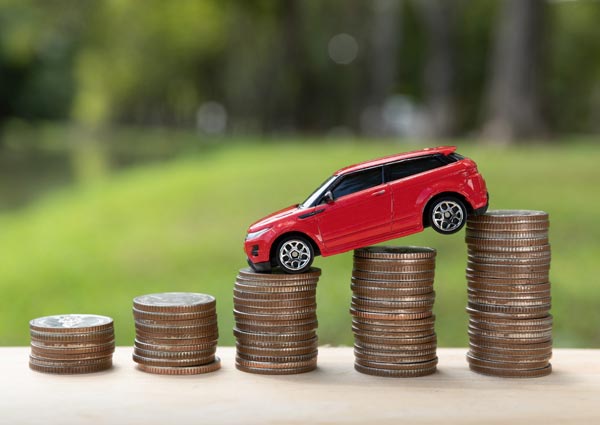
The interest rates on car loan are classified into two types – fixed and floating. Every bank or third party lender charge a different type of rate of interest on car loans according to their rules and regulations. But, a fixed rate of interest is much better than a floating rate of interest as it iss easy to calculate EMIs based on that interest rate.
Fixed interest rates: A fixed rate of interest on a car loan remains unchanged throughout the tenure of the loan. This type of interest rate attracts people who want their loan interest rates to remain the same and not fluctuating. Fixed interest rate prevents the risks that come along floating or variable rates of interest. Such interest rate is calculated on a car loan based on he amount of loan, loan repayment period, and the interest rate.
Floating interest rates: Floating rates of interest are comparatively less than fixed rate of interest. Such interest rates are subject to change when there is a fluctuation in the MCLR or the base rate. When such rates go up, the amount of car loan EMIs will increase. Floating or variable interest rates depend on the kind of security or loan.
The major differences between these two types of interest rates are as follows:
| Fixed interest rate | Fluctuating interest rate |
|---|---|
| The rate of interest is generally higher. | The rate of interest is usually lower. |
| Lower risk is involved as the interest rates are fixed. | Higher risk is involved as interest rates are fluctuating. |
| EMIs are usually constant and unchanged. | EMIs are subject to change based on MCLR changes |
| This rate of interest provides security to the borrowers. | This rate of interest provides savings to the borrowers. |
| It is easy to plan your budget with such interest rates. | It is difficult to plan your budget as the interest rates keeps on changing. |
| This rate of interest is ideal for short loan tenure, i.e. three to ten years. | This rate of interest is suitable for long loan tenure, i.e. 20 to 30 years. |
Factors Affecting Car Loan Interest Rates

There are several factors that influence the interest rates charged on car loans such as:
Credit score: Credit score of a person decides how much car loan he could get from the bank or financial institutions. A credit score above 750 attracts low rate of interest on a car loan. A good credit scores indicates your creditworthiness and lender will have guarantee that you will repay the loan on time. So, if you wish to procure a car loan in the near future, try to maintain a good credit score.
Repayment period: The repayment period or the loan tenure will affect the rate of interest levied on a car loan. The longer repayment period will attract higher rate of interest and cheaper EMIs. Whereas when the repayment period is shorter, the EMIs will be higher and the interest rate will be lower.
Loan Amount: The amount of car loan will have a direct impact on the interest rates. The rate of interest is generally lower on a larger loan amount and higher on a smaller loan amount.
Relationship with the lender: The banks and third parties with whom you have a good transaction history with will offer car loan at a less interest rates. Check the rate of interest on car loans before you approach any other lenders.
Income: If your income is good, you may get a lower rate of interest on your car loan as you will have a greater ability to make the repayment of the loan.
How To Get Quick Car Loan Approval?
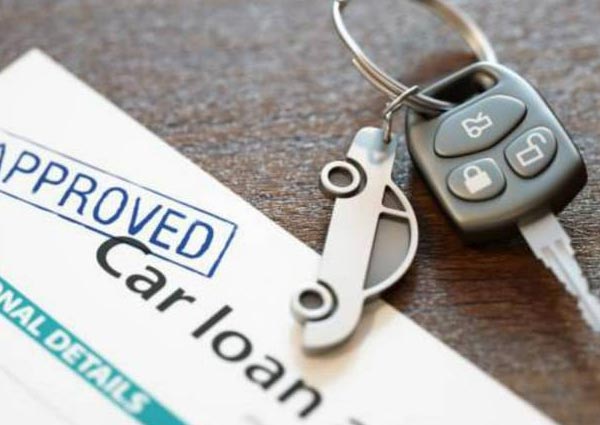
When you are planning to take a car loan to buy a new or a used car, you should always go for a pre-approved loan. Follow these simple steps to get your car loan approved faster:
1. Check your credit score
Make sure that you have a credit score of 750 or above to attract a lower interest rate on your car loan. There are higher chances of the rejection of your loan application if you have defaults or discrepancies in your credit report.
2. Timely payment of bills
You should have minimum monthly pre-tax income and a good debt-to-income ratio (DTI) to avail a car loan. The DTI can be improved by clearing your outstanding credit card debts. Try to make timely payment of your bills at least six months before the loan application. It gives a guarantee to the lender that you will pay your EMIs on time.
3. Search for Car Loan Options
You can find several car loan alternatives in the market to buy your favorite car. Have a look at the prevailing interest rates on car loans of different banks and financial institutions that is best for you.
4. Borrow a minimum loan amount
Try to make the down payment of a maximum amount as this will reduce the loan amount and control your expenditure on the car loan. When a person borrows a lesser amount from the lenders towards a car loan, the loan amount can be repaid faster. A lesser loan amount means shorter loan tenure and smaller EMIs.
5. Try to stay in your budget
The ability of pay off the car loan majorly affects your loan approval. Always go for a car loan scheme that you can afford and that is within your pocket size. When you already have a liability to repay other loans, then you should make sure that you are capable of repaying the car loan as well.
6. Read carefully the terms of the loan
A car loan with long loan tenure and smaller EMIs is not always perfect for you. So, before you apply for a car loan with any bank or finance company, try to pick a plan that has shorter loan tenure and lower interest rates.
7. Take a car insurance with full protection
Every bank or NBFC do not want to incur any losses while sanctioning loans to the borrowers. So, several loan lenders prefer full coverage insurance on your vehicle before offering any car loan. It helps them to recover the debts in case the borrower turns a defaulter.
Bank-Wise Car Loan Interest Rates 2025
| Banks | Car loan interest rates 2025 | Processing fees | Loan amount |
|---|---|---|---|
| SBI (Fixed rate of interest) |
| Applicable | 85% of the on-road price |
| Punjab National Bank (Floating rates of interest) |
WOMEN & CORPORATE ACCOUNT HOLDERS
| 100% PF Fees Waiver till March 2022 | 85% of the on-road price |
| Punjab & Sind Bank |
| 0.25% of Loan Amount + GST | |
| Canara Bank |
| 0.25% of Loan Amount+ GST subject to maximum threshold of Rs 5,000 | 90% of the on-road price |
| Bank of Baroda (Floating rate) |
| Rs. 1,770 + GST + Rs. 1,000 as account opening Charge | 90% of the on-road price |
| Union Bank of India (Floating rate) |
| No Processing Fees | 85% of the on-road price |
| UCO Bank |
| 1% of Loan Amount subject to maximum Rs 1,500 | |
| IDBI Bank (Floating rate) |
| Rs 2,500 + GST | 90% of the ex-showroom price |
| Central Bank of India (Floating rate) |
| 100% Processing Fee Waiver | 90% of the on-road price |
| Kotak Mahindra Bank | Starting at 7.25% p.a. Interest rate is calculated on the basis of Car Model, Credit Profile. Fixed Rate Scheme | Processing fees as per bank’s terms and conditions | 90% of the ex-showroom price |
| Karnataka Bank | Starting at 8.2% p.a. based on the CIBIL Score) | 0.5% of Loan Amount+ GST subject to minimum Rs 2,500 and maximum Rs 10,000 | |
| Private banks like HDFC, ICICI, and Axis Bank (Customers with Pre-approved loan) | 7.5% to 7.85% p.a. | Rs 2,499 to Rs 3,999 as reduced processing fees | 100% of the ex-showroom price |
Best Car Loan Products in 2025
| Banks | Key car loan products | Features |
|---|---|---|
| HDFC Bank | Luxury car loans |
|
| Axis Bank | Small loans |
|
| SBI | Agriculturists and professionals with no income proof |
|
| Free Personal Accident Insurance | Federal Bank |
|
| Lower rates of interest on new and used car loans | Canara Bank |
|
Car Loan Repayment Scheme
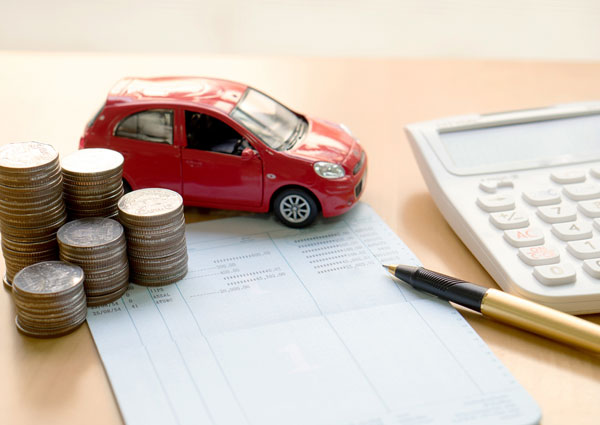
The EMIs of the car loan can be repaid using one of the following repayment schemes:
1. EMI in arrears scheme: Under this method, the EMIs (principal amount and interest rate) are paid at or after the month-end.
2. Advance EMI scheme: Under this method, the EMI payment for car loan is made at the starting of the month.
3. Zero interest scheme: Also known as the 0% finance scheme, a zero interest scheme is a subsidy scheme where the rate of interest is paid to the bank upfront.
Eligibility Criteria for Car Loan

The eligibility criteria for car loan changes from bank to bank. But the most common one are:
- The age of the borrower should be between 18-75 years.
- The minimum net monthly income should be Rs. 20,000.
- The borrower should be self-employed or salaried in a private company or a government undertaking.
Documents Required For Car Loans

There are certain documents that are essential to prove your eligibility to avail car loans.
- ID proof such as passport, Aadhaar card, voter ID, PAN card, and driving license.
- Address proof like passport, Aadhaar card, driving license, utility bills, and ration card.
- Income proof such as salary slips, Form 16, bank statements of last 6 months, and latest income tax returns.
Apart from the above documents, there may be additional documents required by your lender. Make sure you prepare a checklist for the same to avoid any future discrepancies.
The Ultimate Checklist For Applying Car Loan
| S. No. | Steps | Requirement | Inference |
|---|---|---|---|
| 1 | Apply for a car loan | Compare car loan offers of every lender. | Always go for a car loan scheme that offers larger loan amount and lower interest rates. |
| 2 | Submission of income proof |
| Lender wants to ensure that you are capable to repay the loan. |
| 3 | Submission of ID and address proof |
| Lender wants to know your nationality, identity, and permanent address. |
| 4 | Credit History | PAN Card | Lender wants to verify your creditworthiness and ensure that you are capable of repaying the car loan. |
| 5 | Information about car | Sales receipts from the showroom. | Lender should confirm that the deal was made according to the proper rules and regulation. |
| 6 | Proof of Insurance and Driving License | Copies of the car insurance and driving license | Lender wants to ensure that you have followed all protocols related to the car purchase. |
How to Choose Right Car Loan?

Follow the below do’s and don’ts to ensure that you car taken the best car loan in 2025:
The do’s to take the right loan:
- Always compare the car loan schemes of different banks and other lenders and choose the best one.
- Choose a car loan with the best rate of interest and loan amount.
- Always decide that car first that you want to buy before applying for the car loan.
- Be cautious of the hidden charges like fees relating to your car loan.
- Make sure that you avail special offers on your car loan.
- Verify the insurance premium for your car as it is a recurring cost.
The don’ts to consider while taking a car loan:
- Never apply for a car loan that exceeds your eligibility as a borrower as your loan application will get rejected.
- Never apply for a car loan with multiple banks as it reduces your CIBIL score.
- In case your loan application gets rejected, stop applying for it at different banks.
- Never rely on car loans that dealers offer as they do not offer the best rates of interest.
- Never select a car with high maintenance cost as it will increase your expenditure.
Frequently Asked Questions (FAQs) – Car loans 2025
Q. How to calculate car loan EMIs?
The Equated Monthly Installments (EMIs) can be calculated using an online car loan EMI calculator available on several banks’ websites. The EMIs of car loans is dependent on factors such as:
- The size of the car loan
- The rate of interest on the car loan
- Loan tenure
- Processing fees
The EMIs on your car loan will be high if your loan amount is also high and vice-versa.
Q. Can you get 100% car loan to purchase a car?
The maximum loan amount on your car varies from lender to lender. Majorly, banks offer 90% of the on-road price of the car as car loan. However, there are other banks as well that offers 100% of the on-road price as a car loan amount to the borrowers:
Q. What are some common car loan repayment tenures available?
Car loan tenure ranges from 12 months to 84 months i.e. 1 to 7 years.
Q. What car models are financed by banks in India?
Almost all types of cars available in India are financed by the banks and finance companies. Some of the popular ones include-
- Small sized cars
- Medium sized cars
- Commercial vehicles
- Multi utility vehicles (MUVs)
- Sports utility vehicles (SUVs)
Q. How much credit score do you need to get car loans in India?
The CIBIL or credit score as high as 750 are considered ideal to get a car loan in India. But some banks even offer car loans on credit score above 600.
Q. Is it necessary to have a security/guarantor to apply for a car loan?
Not all banks and lenders ask for an additional guarantor or security as the vehicle itself is a collateral security for the car loan. However, when the borrower’s annual income is not as expected, he or she may have to have a guarantor or an extra security to procure a loan.
Q. Will the credit score affect the car loan interest rate?
Yes. A borrower with a high credit score pays a lower rate of interest on the car loan and vice-versa.
Q. Is it possible to repay the entire car loan amount at once?
Yes, any person can repay his or her car loan to save on the extra interest payable in the future. This is only possible after the expiry of six months of the loan tenure from the date of the issue of the car loan. Such facility is offered by only some banks. You need to pay a small fee towards the prepayment of the loan.
Q. Who is the best car loan provider – car dealer or bank?
Bank is always the best option to avail a car loan as it offers a much better interest rate and repayment options to the borrowers as compared to the car dealers.
Q. Do banks offer loan on used cars?
Yes. Many top banks such as HDFC Bank, SBI, and more offer car loans on used cars. The loan amount is 85% of the value of the car and the vehicle should not be more than 5 years old. The maximum loan tenure in case of used cars is 7 years.
Q. What factors are considered by lenders when applying for a car loan?
The factors that considered by lenders when applying for a car loan are –
- Credit score should be 750 or above.
- Employment status
- Job stability
- Residence
- Annual income
- Debt to income ratio
Q. What is the lowest EMI paid for a car loan?
The amount of EMI paid towards a car loan depends on the loan amount, loan tenure, and the rate of interest. To calculate EMI, people can make use of a EMI calculator tool available online on all bank websites.
Q. How much down payment is required to buy a car?
When a person makes a higher down payment to purchase a car, then you need to pay a lower rate of interest as the loan amount will be less. The reason behind this is that when the loan amount is less, the repayment will be faster.
Q. Is it possible to negotiate a lower rate of interest with banks on car loans?
Yes, you can negotiate for a low interest rate on car loans when you have a good credit score, good connections, and a great salary. The sole discretion will lie with the bank.
Q. Will car loan rate of interest be fixed or variable?
Lender offer fixed and variable rates of interest on car loans. Before you apply for a car loan with any lender, you should ask for the type of interest rates they levy on car loans.
Q. Does the type of car affect interest rates on auto loan?
Not necessarily. The price of the car affects the interest rates on car loans. The type of car you are buying do not have any affects on the rates of interest of car loans.
Q. Will the interest rate on auto loan gets reduced in case of prepayment?
Yes. The prepayment reduces the loan amount and attracts lower interest rates on car loans. But when a prepayment of car loan is made, some banks charge a prepayment penalty from the borrowers. You should take the decision of loan prepayment on the basis of the stage of the loan payment, interest rate, etc.
Q. What is the best interest rate – fixed or variable?
Under fixed interest rate, the amount of interest to be paid along with the principal amount will be the same. But in case of a variable interest rate, the amount of interest is subject to change at any time during the loan tenure. It is up to you what kind of interest rate is affordable for you.
Q. Are there any special interest rates for women borrowers?
Yes. Most of the banks offer concessional interest rates on car loans for women borrowers.
Q. What are the average interest rates under different loan tenures?
The average interest rates under different loan tenures are –
- 36 months loan tenure – 3.67% APR
- 48 months loan tenure – 3.74% APR
- 60 months loan tenure – 3.81% APR
- 72 months loan tenure – 3.96% APR
Q. What is a higher car payment?
A higher car payment is made when the payment is made for more than 30% of the total income. Never make the car payment exceeding 15-20% of your total income.

